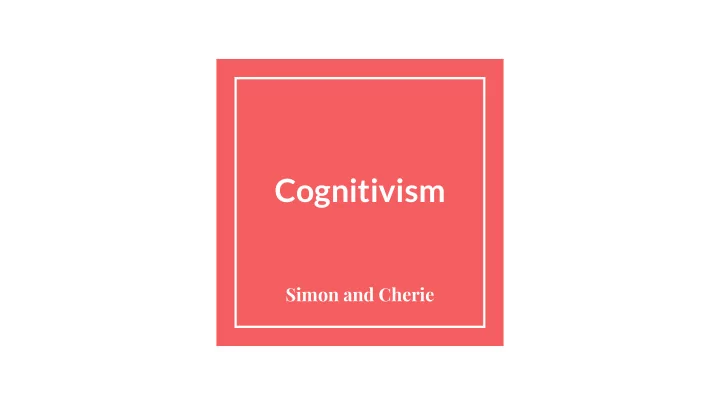

Cognitivism Simon and Cherie
Let’s Learn How to Race in a Seadoo! Source: https://www.microsoft.com/en-CA/store/p/Kinect-Sports-Rivals-Demo/C5CS839TVB7B
Debrief As the participant: What was your experience having an audience doing this type of activity? ● Were you uncomfortable? ● Do you think this is a good way to learn how to do something? Why or why not? ● As the observers: Do you think watching _____ play, do you think you can do better than that ● person? Why or why not? Did you learn from this experience? Why or why not? ●
Debrief Continued... From an anthropological standpoint, as the observers of the observers (ha!): What kinds of interactions do you see observer to observer and observer to ● participant? How do you think this affects learning in this scenario? What behaviours/reactions/commentary do you notice from the observers? Do you think the observers are also learning how to play the game? Why or why ● not?
Source: Lefrancois, Guy R.: Theories of Human Learning. Belmont: Wadsworth, 2000.
Background (Ertmer and Newby) - Stems from rationalism - Values memory - Information stored in organized and meaningful manner - Aided by organizers, analogies, hierarchical relationships, and matrices - Emphasizes complex cognitive processes - Thinking - Problem solving - Information processing - Language - Concept formation Source: DepressedAlien
Learning is... - Discrete changes between states of knowledge - Transferred by - Relating new information to prior knowledge - Simplification (knowledge simplified into basic building blocks) - Standardization (irrelevant information eliminated) - Influenced by - Environmental conditions (explanations, examples/non-examples, corrective feedback, demonstration) - Internal conditions/abilities (values, attitudes, thoughts, how information is attended/coded/transformed/rehearsed/stored/retrieved)
Learners are... - Active participants who demonstrate cognitive processes - Concerned with - What they know - How they acquire knowledge - Encouraged to change by using appropriate learning strategies
Instructional Design (ID) focuses on... - Making connections - New information is effectively and efficiently assimilated and/or accommodated into cognitive structure - Using feedback to guide/support accurate mental connections - Looking to learners to determinate how they activate/maintain/direct learning - Structuring/organizing/sequencing information for optimal processing - Metacognition Source: https://teachingwithtech.lss.wisc.edu/m4w1.htm
Teaching strategies used Advance organizers ● Concept mapping ● Hierarchical relationships ● Matrices ● Framing ● Outlining ● Mnemonic devices ● Analogies ● Source: Tijmen Stam (Wikipedia)
Cherie’s Summary and Analysis of Reflections ● Active Learning ● Self Observation ~ Enactive learning ● Multimodal learning https://bustedupblogger.files.wordpress.com/2014/06/funny-dog-looking-mirror-do nt-even-know-who-am-anymore-pics1.jpg
Simon’s Summary and Analysis of Reflections Technology is too cumbersome/not feasible/as an ends as opposed to a means (there are other methods to achieve active learning) real time feedback -> key to self-observation ● Physically active learning vs mentally active learning Not mutually exclusive (embodied cognition) ● Meaningful learning (No learning outcomes measured, only a small amount of students participating) Vicarious learning ● Link to cognitivism is weak (active learning = constructivism) A flaw in reasoning? ●
U shaped discussion Question: Where on the continuum do you lie: Is Chen et al.’s research studying cognitivism or constructivism? Why? Be prepared to place yourself on the continuum and explain why you believe this to be true.
Food for thought: Cognitivist theory in relation to curricular philosophies How can activities be designed using cognitive theory in each of the 4 philosophies of curriculum? Scholar Academic ● Social Efficiency ● Learner Centred ● Social Reconstruction ● Describe how you implement cognitive theory in your classroom and which philosophy of curriculum it adheres to.
Recommend
More recommend